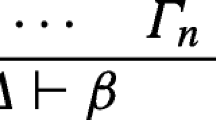Abstract
What kinds of sentences with truth predicate may be inserted plausibly and consistently into the T-scheme? We state an answer in terms of dependence: those sentences which depend directly or indirectly on non-semantic states of affairs (only). In order to make this precise we introduce a theory of dependence according to which a sentence φ is said to depend on a set Φ of sentences iff the truth value of φ supervenes on the presence or absence of the sentences of Φ in/from the extension of the truth predicate. Both φ and the members of Φ are allowed to contain the truth predicate. On that basis we are able define notions such as ungroundedness or self-referentiality within a classical semantics, and we can show that there is an adequate definition of truth for the class of sentences which depend on non-semantic states of affairs.
Similar content being viewed by others
References
Apt, K. and Bol, R.: Logic programming and negation: A survey, J. Logic Programming 19 (20) (1994), 9–71.
Beall, J. C.: Is Yablo’s paradox non-circular?, Analysis 61 (2001), 176–187.
Bolander, T.: Logical theories for agent introspection, Ph.D. Thesis, Technical University of Denmark, 2003.
Bueno, O. and Colyvan, M.: Paradox without satisfaction, Analysis 63 (2003), 152–156.
Burgess, J. P.: The truth is never simple, J. Symbolic Logic 51 (1986), 663–681.
Cantini, A.: A theory of formal truth arithmetically equivalent to ID1, J. Symbolic Logic 55 (1990), 244–259.
Chapuis, A.: Circularity, truth, and the Liar paradox, Ph.D. Thesis, Indiana University, 1993.
Cook, R. T.: Parity and paradox, forthcoming in the LOGICA Yearbook 2002.
Davidson, D.: Mental events, in L. Foster and J. W. Swanson (eds.), Experience and Theory, Duckworth, London, 1970, pp. 79–101.
Gaifman, H.: Pointers to truth, J. Philosophy 89(5) (1992), 223–261.
Gaifman, H.: Pointers to propositions, in A. Chapuis and A. Gupta (eds.), Circularity, Definition, and Truth, Indian Council of Philosophical Research, New Delhi, 2000, pp. 79–121.
Goodman, N.: About, Mind 70 (1961), 1–24.
Goodman, N.: ‘About’ mistaken, Mind 74 (1965), 248.
Grelling, K.: A logical theory of dependence, in 5th International Congress for the Unity of Science, Cambridge, MA, 1939. Reprinted in B. Smith, Foundations of Gestalt Theory, Philosophia Verlag, München, 1988, pp. 217–226.
Gupta, A.: Truth and paradox, J. Philos. Logic 11 (1982), 1–60.
Gupta, A. and Belnap, N.: The Revision Theory of Truth, MIT Press, Cambridge, MA, 1993.
Halbach, V.: Axiomatische Wahrheitstheorien, Akademie Verlag, Berlin, 1996.
Herzberger, H.: Paradoxes of grounding in semantics, J. Philosophy 67 (1970), 145–167.
Herzberger, H.: Erratum to: Paradoxes of grounding in semantics, J. Philosophy 67 (1970), 317.
Horwich, P.: Truth, Clarendon Press, Oxford, 1998.
Kripke, S. A.: Outline of a theory of truth, J. Philosophy 72 (1975), 690–716.
Leitgeb, H.: What is a self-referential sentence? Critical remarks on the alleged (non-)circularity of Yablo’s paradox, Logique et Analyse 177–178 (2002), 3–14.
McGee, V.: Maximal consistent sets of instances of Tarski’s schema (T), J. Philos. Logic 21 (1992), 235–241.
Moschovakis, Y. N.: Elementary Induction on Abstract Structures, North-Holland, Amsterdam, 1974.
Priest, G.: Yablo’s paradox, Analysis 57 (1997), 236–242.
Putnam, H.: Formalization of the concept ‘About’, Philosophy of Science 25(2) (1958), 125–130.
Simmons, K.: Universality and the Liar, Cambridge University Press, Cambridge, 1993.
Sorenson, R.: Yablo’s paradox and kindred infinite liars, Mind 107 (1998), 137–155.
Tarski, A.: Der Wahrheitsbegriff in den formalisierten Sprachen, Studia Philosophica 1 (1935), 261–405.
Tarski, A.: The semantic conception of truth and the foundations of semantics, Philosophy and Phenomenological Research 4 (1944), 341–376.
Tarski, A.: A lattice-theoretical fixpoint theorem and its applications, Pacific J. Math. 5 (1955), 285–309.
Yablo, S.: Grounding, dependence, and paradox, J. Philos. Logic 11 (1982), 117–137.
Yablo, S.: Paradox without self-reference, Analysis 53 (1993), 251–252.
Author information
Authors and Affiliations
Rights and permissions
About this article
Cite this article
Leitgeb, H. What Truth Depends on. J Philos Logic 34, 155–192 (2005). https://doi.org/10.1007/s10992-004-3758-3
Issue Date:
DOI: https://doi.org/10.1007/s10992-004-3758-3



